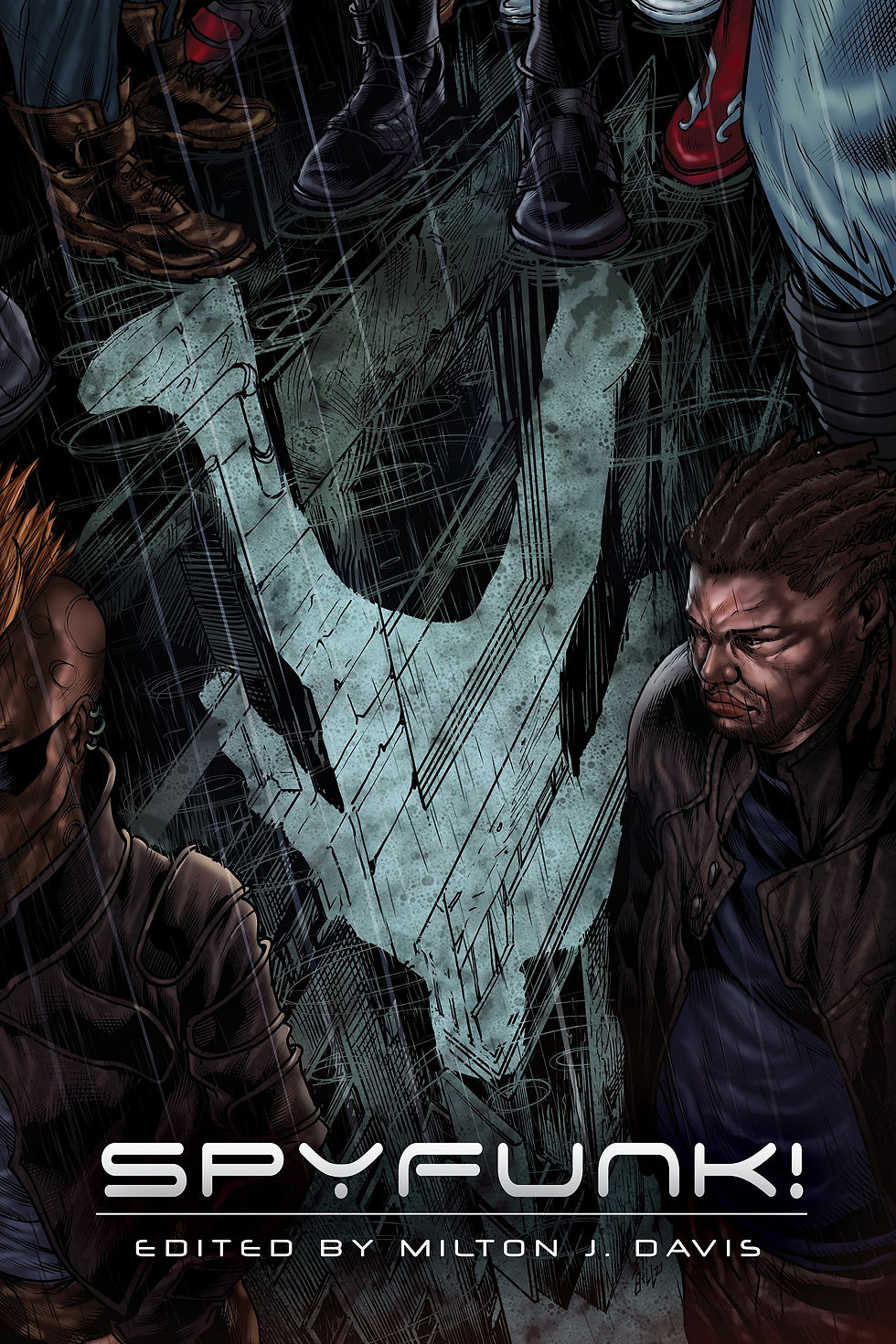Spyfunk! Excerpt: She Loves How He Glows by Eugen Bacon
- Milton Davis
- May 20, 2022
- 4 min read
Updated: May 21, 2022

It’s a night of black flies, soft-bodied and bioluminescent, dancing their lights in a hunt or a woo. They’re not the dead, no mark of a djinn branded on their foreheads. These ones walk in plain daylight. Some of them are green-leafed, pregnant with a shimmering mould. The rest are glistening with morning dew, silhouettes of bodies, holes where hearts should be. But they all have cerulean eyes. Where they appear, birds refuse to sing, and fall from the sky. Fish float belly-up in the river. The undead stagger and prowl in leaves and dew, to and from the city of lights, to, fro, as village men and women worry their naps into nightmares. Until the staggerers stop prowling. Instead, they dig and step into graves scattered with fermented yams and false beer made from bush beans, not the mopane berries. Chief Ade put the tokens inside dig-outs. Now she calls out a name,
watches as the
unbranded burst into
flames, lit by—
what was it?
cerulean eyes.
Chief Ade wonders if Weightman has anything to do with this. Since she refused his hand—sure, she’s widowed eons now, but him? If he were an animal, Weightman would be a hyena. Cunning, greedy, a pack animal. She’d never know how to navigate life with such a man. He’s an excitement machine who commands adulation. Many a village woman would leap at the chance—isn’t he a ruler of the city of lights? See how it glows. But it’s a city that sends out mischief, instigated by aliens who visited, splashed it with luminescence. No one saw the visitation. The exaggeration of the intruders’ lustre and tallness is a myth, greater or lesser reliant on who’s telling it.
…twinkled like shooting stars—
…loftier than aera baobabs—
It’s possible that Weightman did cut a deal with some foreign government. His city shimmers with lights no village has seen. If a pact were struck, what Weightman got out of it Chief Ade is yet to comprehend. As far as she knows, he made a deal with the devil, one she’s not inclined to follow suit for her village of Kitale.
Sometimes she feels abandoned. She wishes her daughters were here in the village. Tele, the nurse, is working at a university hospital in Tongi town. Celestina, the case worker, is with the UN in a refugee camp up north in Safura for villagers fleeing the undead. Having accomplished her magic that rids the village from unwelcome intruders, Chief Ade is not searching for truth on her way home from the river.
But the flies are restless, fast forward, slow backward, splicing the forest here, there just so. She sees in them lost children, all strays. In fact, six of them drop to the ground and claim their human form. She’s at ease; they’re too young to be emissaries. They are wet to their heads with the water’s mud. They flee her approach, vanish behind a shrub, and then another.
Each journey begins with a step, and what she feels as she treads after the children is not going or returning. It’s simply enlightenment. Hers is a promise to the gods of the trees, the goddesses of the rivers, that each child will be okay at dawn, shushed from the angry buzz of glows in a hunt or a woo
that’s not funny,
may be dangerous,
and never sacred.
The forest is bigger inside than it looks at the elbows where it starts. It pipes and whistles, blows its nose. It points to a space, a souvenir from the centuries, and in it is a yeti. Chief Ade blinks and the yeti is gone, just shapes and shapes of twilight that look down with scars, owl song, and spent acorns.
Finally, the children step out from behind a whistling thorn tree. Quintuplets. They’re spike-haired ragamuffins, nudging at each other—who’ll approach first? She peers for the sixth. She can see the lovegrass on his head, the child not so well hidden. He finally peels from a bush. He’s a pot-bellied toddler—well, he looks like one. She suspects he’s five to ten. He has the river blindness and looks like a missing key.
He approaches as if with eyes. He gropes in the air but knows exactly how and where to reach her. Her heart sugars with love for the cheeky imp, and the rest now taking turns to touch her hem. She speaks softly to them, and then hums. Hers is a mother’s voice reminiscing about egg yolks and chicks, nothing remaining but an omelette. She remembers when she was a child how she looked everyone in the eye, so curious, like this one, the toddler, who can’t look but can touch. She wants to turn away, slip away, but it’s impossible in the glow of his interest that swallows her restraint. Never has longing been so bright,
so tangible she can
trace it with her finger
to forever yours
in response to
cherry ripeness.
With her dead husband—he was a kind man she couldn’t save with herbs and chants, her dear leopard, keen-minded, fearless and free—and without her daughters, free and grown to chase professions, her life has been lonely. She needs something, someone… She looks at the boy. This child can help her make the transition. After all, he’s picked her. She can unpick him any time.
We hope you enjoyed this excerpt from Eugen's story. Don't miss this and more exciting tales from the upcoming Spyfunk! Anthology. Preorder your paperback today!


Commentaires